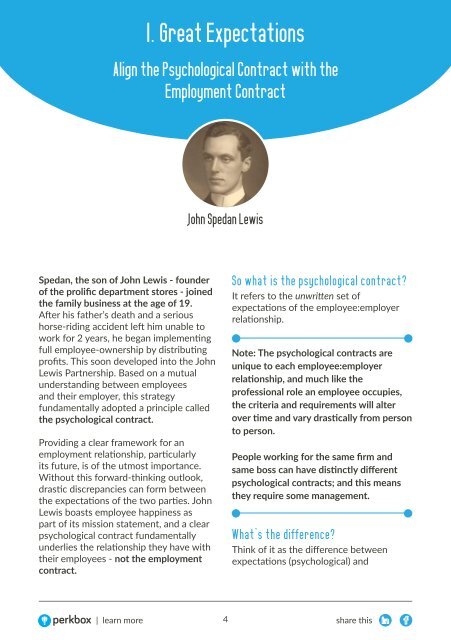I Lead When I Follow
I Lead When I Follow is the modern manager’s best friend. Taking inspiration from leaders such as Mahatma Gandhi, Marcus Aurelius and Eleanor Roosevelt, the philosophies by which they lived have been applied distilled and applied to the modern workplace. This eBook will allow you to build on the knowledge of the past to manage your team more effectively, and lead your company to success!
I Lead When I Follow is the modern manager’s best friend. Taking inspiration from leaders such as Mahatma Gandhi, Marcus Aurelius and Eleanor Roosevelt, the philosophies by which they lived have been applied distilled and applied to the modern workplace.
This eBook will allow you to build on the knowledge of the past to manage your team more effectively, and lead your company to success!
Create successful ePaper yourself
Turn your PDF publications into a flip-book with our unique Google optimized e-Paper software.
1. Great Expectations<br />
Align the Psychological Contract with the<br />
Employment Contract<br />
John Spedan Lewis<br />
Spedan, the son of John Lewis - founder<br />
of the prolific department stores - joined<br />
the family business at the age of 19.<br />
After his father’s death and a serious<br />
horse-riding accident left him unable to<br />
work for 2 years, he began implementing<br />
full employee-ownership by distributing<br />
profits. This soon developed into the John<br />
Lewis Partnership. Based on a mutual<br />
understanding between employees<br />
and their employer, this strategy<br />
fundamentally adopted a principle called<br />
the psychological contract.<br />
Providing a clear framework for an<br />
employment relationship, particularly<br />
its future, is of the utmost importance.<br />
Without this forward-thinking outlook,<br />
drastic discrepancies can form between<br />
the expectations of the two parties. John<br />
Lewis boasts employee happiness as<br />
part of its mission statement, and a clear<br />
psychological contract fundamentally<br />
underlies the relationship they have with<br />
their employees - not the employment<br />
contract.<br />
So what is the psychological contract?<br />
It refers to the unwritten set of<br />
expectations of the employee:employer<br />
relationship.<br />
Note: The psychological contracts are<br />
unique to each employee:employer<br />
relationship, and much like the<br />
professional role an employee occupies,<br />
the criteria and requirements will alter<br />
over time and vary drastically from person<br />
to person.<br />
People working for the same firm and<br />
same boss can have distinctly different<br />
psychological contracts; and this means<br />
they require some management.<br />
What’s the difference?<br />
Think of it as the difference between<br />
expectations (psychological) and<br />
4<br />
| learn more share this


